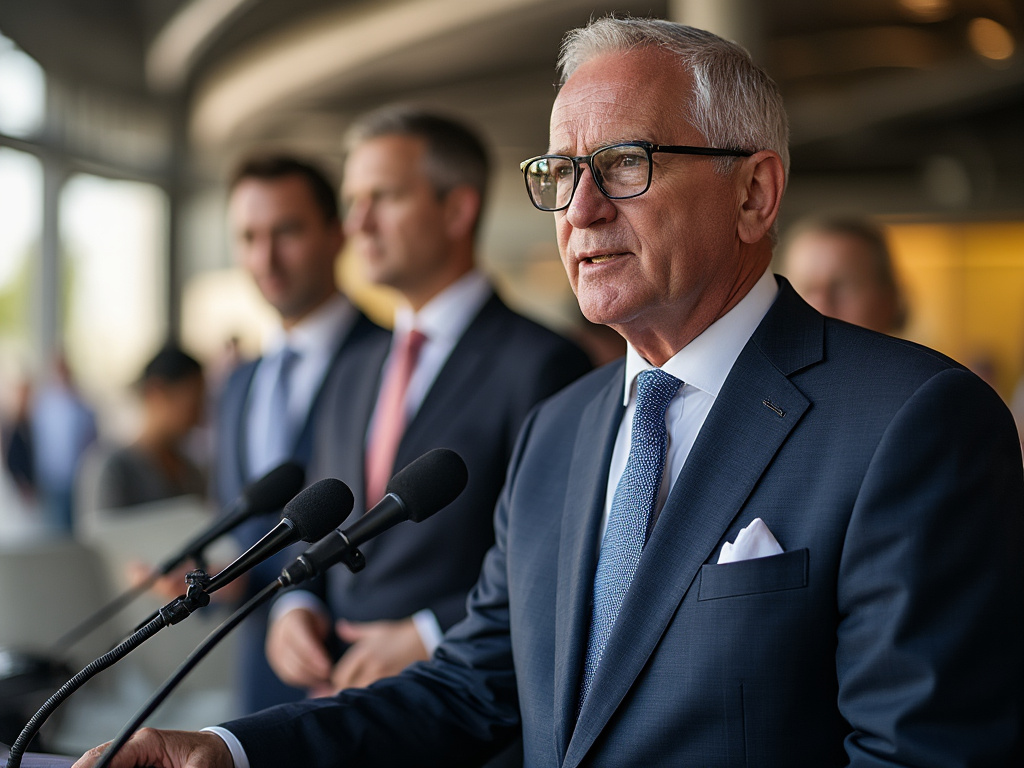
Australia's Defence Strategy Faces Scrutiny Ahead of Election Amidst Global Tensions
Experts raise concerns over Australia's defence spending and strategy as the country approaches a federal election amid evolving international threats.
As Australia prepares for its upcoming federal election on May 3, 2023, the nation finds itself navigating a complicated global landscape characterized by deteriorating security tensions.
The presence of numerous vessels in the region, particularly from China, has spotlighted national interests and raised questions about the adequacy of Australia's defence strategy and spending.
The Opposition leader, Peter Dutton, has recently highlighted concerns regarding US tariffs that were enacted during Donald Trump's presidency.
Despite this issue emerging in political discourse, defence remains a peripheral topic for both major parties in their campaign pitches thus far.
Military historian Albert Palazzo and national security expert Jennifer Parker from the Australian National University have expressed skepticism regarding the urgency for defence to be a prominent election issue, noting that both parties appear hesitant to focus on it.
Parker indicated that Australia faces increasingly complex security requirements, with geopolitical changes prompting questions about the sufficiency of the nation’s defence posture.
She referred to earlier defence white papers from 2006 and 2009 that acknowledged a shifting global order, particularly concerning China's military expansion and assertiveness in the South China Sea and around Taiwan.
The ongoing conflict in Ukraine and instability in the Middle East further underscore the need for a robust Australian defence strategy.
In light of uncertainty over US reliability as an ally, drawn from comments by former U.S. officials, Palazzo characterized Australia’s dependence on the US for security as potentially precarious.
Both experts concurred that increased defence spending and capability upgrades are essential to adequately protect Australia’s interests.
Australia’s defence capabilities have been scrutinized in light of the 2023 strategic review, which underscored that the Australian Defence Force (ADF) is not fully fit for purpose.
The government has adopted a strategy focused on deterrence, aiming to dissuade potential adversaries through the acquisition of nuclear-powered submarines and enhancements to strike capabilities.
Defence Minister Richard Marles has emphasized the importance of strong alliances in maintaining national security but stressed the need for Australia to bolster its independent military capabilities.
Recent incursions by Chinese naval vessels into Australian waters have highlighted concerns regarding regional security dynamics.
Vice Admiral Justin Jones, the country's Chief of Joint Operations, confirmed a Chinese research vessel's presence in the area, prompting further examination of Australia’s strategic response options.
In terms of defence expenditure, the Australian government has allocated $58.99 billion for the 2025-26 financial year, projecting a rise beyond 2.3% of GDP by the early 2030s.
Critics, including Parker, assert that the majority of these funds may not represent new investments but rather previously announced commitments that have lost value due to inflation.
They highlight significant gaps in capabilities, particularly in areas such as mine warfare and ballistic missile defense, asserting the need for further financial resources.
The Coalition has declared intentions to unveil a significant defence funding commitment during the campaign, with initial pledges including an investment in additional F-35 fighter aircraft.
They are reportedly considering a boost in defence spending to at least 2.5% of GDP. This comes amidst discussions on leveraging Australia's critical minerals in defence negotiations with the US.
Parker cautioned against the potential risks of intertwining defence commitments with economic negotiations, suggesting the foundational importance of Australia’s long-standing alliance with the US must remain the priority.
In summary, as Australia navigates an uncertain global security environment, questions surrounding its defence spending, strategic capabilities and alliances remain pivotal in the pre-election landscape.
The presence of numerous vessels in the region, particularly from China, has spotlighted national interests and raised questions about the adequacy of Australia's defence strategy and spending.
The Opposition leader, Peter Dutton, has recently highlighted concerns regarding US tariffs that were enacted during Donald Trump's presidency.
Despite this issue emerging in political discourse, defence remains a peripheral topic for both major parties in their campaign pitches thus far.
Military historian Albert Palazzo and national security expert Jennifer Parker from the Australian National University have expressed skepticism regarding the urgency for defence to be a prominent election issue, noting that both parties appear hesitant to focus on it.
Parker indicated that Australia faces increasingly complex security requirements, with geopolitical changes prompting questions about the sufficiency of the nation’s defence posture.
She referred to earlier defence white papers from 2006 and 2009 that acknowledged a shifting global order, particularly concerning China's military expansion and assertiveness in the South China Sea and around Taiwan.
The ongoing conflict in Ukraine and instability in the Middle East further underscore the need for a robust Australian defence strategy.
In light of uncertainty over US reliability as an ally, drawn from comments by former U.S. officials, Palazzo characterized Australia’s dependence on the US for security as potentially precarious.
Both experts concurred that increased defence spending and capability upgrades are essential to adequately protect Australia’s interests.
Australia’s defence capabilities have been scrutinized in light of the 2023 strategic review, which underscored that the Australian Defence Force (ADF) is not fully fit for purpose.
The government has adopted a strategy focused on deterrence, aiming to dissuade potential adversaries through the acquisition of nuclear-powered submarines and enhancements to strike capabilities.
Defence Minister Richard Marles has emphasized the importance of strong alliances in maintaining national security but stressed the need for Australia to bolster its independent military capabilities.
Recent incursions by Chinese naval vessels into Australian waters have highlighted concerns regarding regional security dynamics.
Vice Admiral Justin Jones, the country's Chief of Joint Operations, confirmed a Chinese research vessel's presence in the area, prompting further examination of Australia’s strategic response options.
In terms of defence expenditure, the Australian government has allocated $58.99 billion for the 2025-26 financial year, projecting a rise beyond 2.3% of GDP by the early 2030s.
Critics, including Parker, assert that the majority of these funds may not represent new investments but rather previously announced commitments that have lost value due to inflation.
They highlight significant gaps in capabilities, particularly in areas such as mine warfare and ballistic missile defense, asserting the need for further financial resources.
The Coalition has declared intentions to unveil a significant defence funding commitment during the campaign, with initial pledges including an investment in additional F-35 fighter aircraft.
They are reportedly considering a boost in defence spending to at least 2.5% of GDP. This comes amidst discussions on leveraging Australia's critical minerals in defence negotiations with the US.
Parker cautioned against the potential risks of intertwining defence commitments with economic negotiations, suggesting the foundational importance of Australia’s long-standing alliance with the US must remain the priority.
In summary, as Australia navigates an uncertain global security environment, questions surrounding its defence spending, strategic capabilities and alliances remain pivotal in the pre-election landscape.
AI Disclaimer: An advanced artificial intelligence (AI) system generated the content of this page on its own. This innovative technology conducts extensive research from a variety of reliable sources, performs rigorous fact-checking and verification, cleans up and balances biased or manipulated content, and presents a minimal factual summary that is just enough yet essential for you to function as an informed and educated citizen. Please keep in mind, however, that this system is an evolving technology, and as a result, the article may contain accidental inaccuracies or errors. We urge you to help us improve our site by reporting any inaccuracies you find using the "Contact Us" link at the bottom of this page. Your helpful feedback helps us improve our system and deliver more precise content. When you find an article of interest here, please look for the full and extensive coverage of this topic in traditional news sources, as they are written by professional journalists that we try to support, not replace. We appreciate your understanding and assistance.










